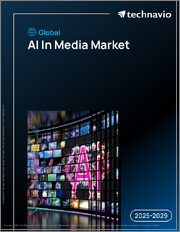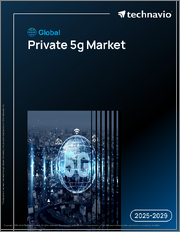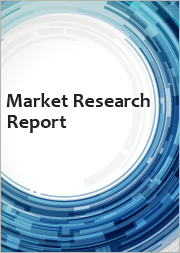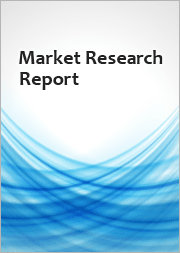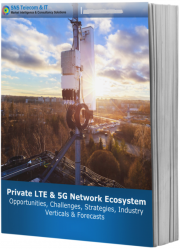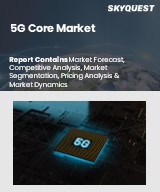
|
시장보고서
상품코드
1850438
5G 코어 시장 : 조직 규모, 전개 유형, 컴포넌트, 최종 사용 산업별 - 세계 예측(2025-2032년)5G Core Market by Organization Size, Deployment Type, Component, End Use Industry - Global Forecast 2025-2032 |
||||||
5G 코어 시장은 2032년까지 연평균 복합 성장률(CAGR) 35.99%로 566억 5,000만 달러에 이를 것으로 예측됩니다.
| 주요 시장 통계 | |
|---|---|
| 기준 연도 : 2024년 | 48억 4,000만 달러 |
| 추정 연도 : 2025년 | 65억 5,000만 달러 |
| 예측 연도 : 2032년 | 566억 5,000만 달러 |
| CAGR(%) | 35.99% |
클라우드 네이티브 5G 핵심 아키텍처가 서비스 혁신과 가치 창출의 중심이 되어 연결성, 컴퓨팅, 운영 모델을 재편하는 결정적 기술 전환점
차세대 코어 네트워크가 성숙하고 통신 사업자들이 레거시 아키텍처에서 클라우드 네이티브 소프트웨어 중심 플랫폼으로 전환함에 따라 통신 산업은 매우 중요한 전환기를 맞이하고 있습니다. 이러한 진화는 운영 민첩성에 대한 통신 사업자의 요구, 저지연 및 엣지 지원 서비스 수익화 필요성, 가상화 및 자동화를 통한 자본 지출 및 운영 지출 최적화의 필요성과 같은 수렴하는 압력에 의해 추진되고 있습니다. 이러한 배경에서 5G 핵심 기술은 단순한 점진적 업그레이드가 아니라 기업 및 소비자 생태계 전반의 연결성, 컴퓨팅, 데이터 관리의 통합 방식을 재정의하는 것입니다.
네트워크가 프로그래머블화되고 네트워크 기능이 컨테이너화된 환경으로 이동함에 따라, 지속적인 통합과 지속적 배포(CD) 관행, 관찰 가능성, 정책 기반 오케스트레이션을 우선시하는 새로운 운영 모델이 등장하고 있습니다. 그 결과, 연결 공급자, 클라우드 하이퍼스케일러, 시스템 통합사업자 간의 전통적인 경계가 모호해지면서 새로운 파트너십 아키텍처와 경쟁 구도가 생겨나고 있습니다. 리더의 당면 과제는 기술 로드맵을 5G 코어의 고유한 성능과 프로그래머블 특성을 활용하여 벤더의 다양성과 상호운용성 리스크를 관리하면서 기술 로드맵을 상업적 제안으로 전환하는 것입니다.
중요한 것은 규제와 보안에 대한 고려가 전개 계획에서 중심적인 역할을 하게 되었습니다는 점입니다. 프라이버시 규제, 국경 간 데이터 흐름의 제약, 국가별 보안 프레임워크는 아키텍처, 벤더 선정, 민감한 워크로드를 배치할 위치 선택에 영향을 미칩니다. 요약하면, 클라우드 네이티브 5G 코어로의 전환은 새로운 서비스와 밸류체인에 큰 기회를 제공하는 동시에 엄격한 아키텍처 규율과 생태계 연계에 대한 현실적인 접근을 요구하고 있습니다.
클라우드 네이티브 도입, 엣지 배포, 서비스 수익화, 공급망 다각화 등의 경쟁 트렌드는 경쟁 우위 및 구현 전략을 재정의하고 있습니다.
5G 코어 구축의 경쟁 환경과 기술 환경은 몇 가지 혁신적인 변화로 인해 크게 변화하고 있으며, 통신 사업자와 기업이 네트워크 현대화를 계획하고 실행하는 방식도 변화하고 있습니다. 첫째, 클라우드 네이티브 원칙의 확산이 가속화되고, 사업자들은 컨테이너 오케스트레이션, 마이크로 서비스 설계, 플랫폼 엔지니어링을 수용하고 있습니다. 이러한 변화는 새로운 서비스 시장 출시 시간을 단축하고 보다 역동적인 스케일링을 가능하게 하는 동시에, 강력한 CI/CD 파이프라인과 분산된 환경 전반의 관측 가능성의 중요성을 증가시키고 있습니다.
둘째, 엣지 연속체는 개념에서 실용적인 배포로 이동하고 있습니다. 컴퓨팅이 사용자 및 디바이스 근처로 이동함에 따라, 중앙 집중식 코어 기능과 분산형 엣지 노드의 상호 작용은 제조, 의료, 미디어 등 지연에 민감한 용도에 결정적인 영향을 미칩니다. 그 결과, 사업자들은 규모 효율성을 중시하는 중앙집중형 플랫폼과 성능을 중시하는 워크로드를 위한 엣지 사이트 사이에서 투자의 균형을 맞추기 위해 노력하고 있습니다.
셋째, 비즈니스 모델은 순수한 연결성 판매에서 매니지드 프라이빗 네트워크, 서비스형 네트워크(Network-as-a-Service) 서비스, 산업별 용도 플랫폼과 같은 성과 지향적 서비스로 진화하고 있습니다. 이러한 모델에서는 기업 고객과의 긴밀한 협력과 영업 및 제품 관리 능력의 전환이 요구됩니다. 마지막으로, 공급망 및 규제 역학은 공급업체와 도입 거점의 지리적 다양화, 상호운용성 테스트, 보안 강화, 탄력적 공급 전략에 대한 강조를 촉진하고 있습니다. 이러한 추세를 종합하면, 향후 5G 코어 상용화 단계에서는 민첩성, 파트너 오케스트레이션, 운영의 성숙도가 주요 차별화 요소가 될 것입니다.
정책 주도의 무역 조정은 공급망 탄력성, 현지 조달, 모듈 식 설계 접근 방식을 장려하여 배포 일정과 상업적 마진을 보호합니다.
최근 정책 사이클에서 미국이 추가적인 무역 조치와 관세 조정을 시행함에 따라 세계 기술 공급망과 부품 조달 전략에 대한 감시가 강화되고 있습니다. 관세가 핵심 네트워크 구축에 사용되는 핵심 구성 요소 및 장비에 영향을 미치는 경우, 기업은 조달의 복잡성에 직면하고 상륙 비용과 배송 시간을 관리하기 위해 공급업체 포트폴리오를 재평가해야 합니다. 이에 따라 많은 사업자와 벤더들은 대체 공급업체 선정, 긴 납기 품목의 재고 버퍼 증가, 현지 조달 가속화 등 조달 전략의 다각화를 추진하고 있습니다.
또한, 관세는 국경 간 서비스 제공 및 하드웨어 리노베이션 주기의 경제성에도 영향을 미칩니다. 따라서 네트워크 사업자와 시스템 통합사업자들은 부가가치 서비스 및 관리형 제공 제품과 관세 제도의 상호 작용에 특히 주의를 기울이면서 전체 구축 지역에서 총소유비용을 재검토하고 있습니다. 동시에 파트너 시장의 규제 대응은 다국적 고객이 중요한 워크로드를 호스팅하는 위치에 영향을 미치는 비대칭성을 야기하고, 일부 용도를 컴플라이언스를 간소화하는 리저널 클라우드 또는 엣지 플랫폼으로 유도할 수 있습니다.
중요한 것은 관세 인상으로 인해 독점 하드웨어 부품에 대한 의존도를 낮추는 모듈형 설계와 소프트웨어 중심 설계에 대한 투자가 촉진되었습니다는 점입니다. 추상화 계층과 개방형 인터페이스를 강조함으로써 사업자는 특정 하드웨어 공급 제약에 노출될 위험을 줄이고, 서비스 연속성을 저해하지 않고 구성 요소를 대체할 수 있는 유연성을 확보할 수 있습니다. 요컨대, 무역 정책의 전환은 전개 일정을 유지하고 이윤을 확보하기 위해 공급망 회복력 대책, 아키텍처 조정 및 상업 계약 전략의 현실적인 조합을 촉구하고 있습니다.
조직의 규모, 도입 아키텍처, 구성 요소 구성, 수직적 수요 신호를 세분화하여 명확한 도입 경로와 가치 우선순위를 파악할 수 있습니다.
세분화에 기반한 통찰력을 통해 조직 규모, 도입 형태, 구성 요소 구성, 최종 사용 업종에 따라 전략적 우선순위와 도입 패턴이 다르다는 것을 알 수 있습니다. 조직 규모별로 보면, 대기업은 복잡하고 미션 크리티컬한 이용 사례를 지원하기 위해 통합 프라이빗 네트워크 솔루션과 가치 생태계 파트너십을 추구하는 반면, 중소기업은 사내 운영 오버헤드를 최소화하고 가치 실현 시간을 단축하기 위해 매니지드 서비스를 우선시하는 경우가 많습니다. 반면, 독립형 아키텍처를 선택한 기업들은 네트워크 슬라이싱, 초저지연 프로파일 등 5G의 기능을 최대한 활용하기 위해 클라우드 네이티브 핵심 기능에 집중 투자하고 있습니다.
구성 요소의 세분화를 살펴보면, 특히 엣지 컴퓨팅 노드와 무선 액세스 인프라에서 하드웨어는 여전히 성능 및 안정성 요구 사항의 중심이 되고 있으며, 소프트웨어 및 서비스는 차별화의 주요 수단으로 자리 잡고 있습니다. 소프트웨어 플랫폼은 오케스트레이션, 정책 제어, 분석을 가능하게 하고, 서비스(매니지드 서비스 및 전문 서비스)는 복잡한 분산 환경 운영에 필요한 구현 전문성과 라이프사이클 관리를 제공합니다. 자동차 산업에서는 결정론적 커넥티비티와 V2X 통합이 가장 중요하며, BFSI에서는 보안, 데이터 레지던시, 저지연 트랜잭션 처리가 요구되며, 에너지 및 유틸리티에서는 신뢰성과 원격 모니터링이 핵심 요구사항이고, 헬스케어에서는 프라이버시, 지연시간, 디바이스 상호연동성이 도입 선택의 기준이 되며, 미디어 엔터테인먼트에서는 결정론적 네트워킹과 OT/IT 융합이 필수적입니다. 디바이스 상호운용성이 도입 선택의 기준이 되고, 제조업에서는 결정론적 네트워킹과 OT/IT 컨버전스가 필수적이며, 미디어 및 엔터테인먼트에서는 높은 처리량, 저지연 전송, 엣지 렌더링 기능이 핵심입니다. 이러한 세분화 렌즈는 차별화된 시장 전략, 솔루션 패키징, 파트너 에코시스템의 우선순위를 정하는 데 도움이 됩니다.
미주, 유럽, 중동 및 아프리카, 아시아태평양별로 각기 다른 규제 환경, 생태계 성숙도, 기업의 우선순위에 따라 각기 다른 전개 전략과 파트너십 전략이 형성되고 있습니다.
미주, 유럽, 중동/아프리카, 아시아태평양별로 기술 선택, 파트너십 모델, 규제 준수 접근 방식은 지역적 역학관계의 영향을 받아 각기 다른 형태로 형성되고 있습니다. 북미와 남미에서 상업적 모델은 기업 현대화를 위한 프라이빗 무선 솔루션, 하이퍼스케일러 플랫폼과의 클라우드 네이티브 통합, 빠른 시장 출시 및 사업자가 관리하는 서비스에 대한 보상 경쟁에 초점을 맞추었습니다. 한편, 데이터 보호와 중요 인프라의 복원력을 중시하는 규제는 사업자의 아키텍처 선택과 민감한 워크로드 배치에 영향을 미치고 있습니다.
중동 및 아프리카에서는 통신 사업자와 기업들이 다양한 규제와 싸우고 있으며, 상호운용성 표준이 중요시되고 있어 개방형 아키텍처와 멀티 벤더 생태계가 장려되고 있습니다. 국경을 초월한 협업과 범지역적 서비스 제공을 위해서는 데이터 주권 요구사항에 대한 세심한 대응이 필요하기 때문에 많은 기업들이 지역 분산형 엣지 플랫폼과 강력한 컴플라이언스 툴셋을 채택하고 있습니다. 반면, 아시아태평양은 도시 지역에서의 급속한 확산, 산업계의 중요한 5G 이니셔티브, 국내 역량 구축을 위한 적극적인 국가 전략 등 이질적인 요소들이 혼합되어 규모 중심의 중앙 집중식 솔루션과 고도로 현지화된 엣지 구현을 모두 촉진하고 있습니다.
이러한 지역적 차이는 벤더의 선택, 전개 순서, 파트너십 전략에 영향을 미칩니다. 성공적인 이니셔티브는 규제 이질성, 지역 기술 생태계, 기업의 디지털화 성숙도 차이를 고려하고, 도입이 기술적 성과와 상업적 실행 가능성 기준을 모두 충족할 수 있도록 해야 합니다.
벤더의 차별화는 컴포넌트 제공에서 플랫폼 오케스트레이션, 생태계 구현, 통합 위험 감소를 위한 성과 중심의 상업적 모델로 전환되고 있습니다.
벤더, 통합업체, 서비스 제공업체 간의 경쟁 역학은 플랫폼 기능, 생태계 오케스트레이션, 개별 컴포넌트가 아닌 엔드투엔드 결과물을 제공할 수 있는 능력을 중심으로 수렴되고 있습니다. 장기적인 유연성을 중시하는 사업자들은 개방형 인터페이스, 강력한 개발자 생태계, 강력한 관측가능성 도구 세트를 우선시하는 기술 공급업체를 선호하는 경향이 있습니다. 시스템 통합사업자와 매니지드 서비스 제공업체는 전문 지식과 검증된 운영 플레이북을 보유하고 있어 턴키 솔루션을 원하는 기업 고객에게 점점 더 중요한 존재가 되고 있습니다.
동시에 칩셋 제조업체와 하드웨어 제조업체는 여러 벤더를 지원하고 공급 제약이 발생했을 때 대체를 촉진하는 모듈식 상호 운용 가능한 플랫폼에 대한 수요에 대응하고 있습니다. 소프트웨어 벤더들은 사업자가 연결성을 보다 수익성 높은 서비스로 전환할 수 있도록 분석, 정책 프레임워크, 수익화 도구로 차별화를 꾀하고 있습니다. 클라우드 제공업체, 네트워크 공급업체, 전문 통합업체 간의 전략적 파트너십은 일반적이며, 고객의 통합 위험을 완화하는 혼합형 서비스를 창출하고 있습니다.
구매자는 벤더를 선택할 때 실제 도입 실적, 업그레이드 경로의 명확성, 보안 보증 및 라이프사이클 지원에 대한 벤더의 접근 방식을 중요하게 고려합니다. 경쟁사의 포지셔닝은 기술력뿐만 아니라 고객과 솔루션을 공동 개발하는 능력, 투명한 로드맵 제공, 생태계 전체의 인센티브를 조정하는 유연한 상업적 모델 제공 등을 점점 더 많이 반영하게 될 것입니다.
개방형 아키텍처, 공급업체 다각화, 운영 자동화, 규제와 보안 관행의 균형을 맞추고, 가치 실현을 가속화하는 성과 중심의 현대화 청사진을 채택합니다.
업계 리더은 공급망 및 규제 리스크를 줄이면서 아키텍처 선택을 상업적 목표와 일치시키는 적극적이고 점진적인 접근 방식을 채택해야 합니다. 먼저, 측정 가능한 비즈니스 성과와 연계된 명확한 이용 사례의 우선순위를 정하고, 가장 전략적으로 가치가 높은 기능을 투자 대상으로 삼는다. 다음으로, 벤더에 구애받지 않는 아키텍처의 청사진을 공식적으로 수립합니다. 이 청사진은 개방형 인터페이스, 모듈식 구성 요소, 이식성을 중시하며, 과도한 재작업 없이 공급업체 교체, 멀티 클라우드, 멀티 에지 배포를 가능하게 합니다.
동시에 대체 공급업체 인증, 관세 변동성을 고려한 유연한 상거래 조건 협상, 장기 납기 품목의 재고 계획 및 물류 위기 관리 계획 수립 등 조달 및 공급업체 관리를 강화합니다. 운영 측면에서는 플랫폼 엔지니어링 역량, 관측 가능성, 자동화에 투자하여 도입 시간과 운영 오버헤드를 줄입니다. 특히 제조업, 헬스케어 등의 업종에서는 전문 지식을 제공하는 생태계 파트너십을 육성하고, 기업에서 채택을 가속화할 수 있는 공동 시장 개척을 합니다.
마지막으로, 규제와 보안에 대한 고려를 아키텍처 결정에 처음부터 반영하고, 데이터 레지던시, 암호화, 아이덴티티 프레임워크가 설계에 통합되어 있는지 확인합니다. 성과에 초점을 맞춘 체계적인 로드맵에 따라 단기적인 회복탄력성 조치와 장기적인 플랫폼 투자의 균형을 유지함으로써, 리더는 실행 위험을 효과적으로 관리하면서 차세대 핵심 네트워크의 전략적 이점을 누릴 수 있습니다.
전문가 인터뷰, 문서 분석, 시나리오 테스트를 결합한 엄격한 혼합 방법론적 접근법을 통해 핵심 네트워크의 실제 도입 패턴과 복원력 전략을 검증했습니다.
이 조사 방법은 전문가에 의한 1차 조사와 구조화된 2차 분석 및 시나리오에 기반한 통합을 결합하여 확실하고 실용적인 결과를 얻을 수 있도록 했습니다. 1차 조사에서는 네트워크 사업자, 기업 CIO, 솔루션 아키텍트, 시스템 통합사업자, 공급망 전문가와의 심층 인터뷰를 통해 현실적인 제약 조건, 구축 경험, 상업적 모델을 검증했습니다. 이러한 질적 인풋을 바탕으로 구현 패턴, 벤더 선정 기준, 산업별 요구사항이 도출되었습니다.
2차 분석에서는 기술 표준, 공공 규제 당국 신고, 벤더의 제품 문서, 업계 백서 등을 검토하여 기술 역량과 통합에 대한 고려 사항을 매핑했습니다. 시나리오 분석에서는 공급망 중단, 관세 변화, 다양한 도입 아키텍처의 영향을 검토하여 현실적인 완화 전략과 복원력 옵션을 만들었습니다. 교차 검증을 통해 현지 인터뷰와 문서 증거와의 정합성을 확보하고, 분석가들의 워크숍을 반복하면서 분류법과 세분화 프레임워크를 개선하여 운영 현실을 반영했습니다.
프로세스 전반에 걸쳐 전제조건의 투명성, 통찰력의 출처에 대한 추적성, 권고안의 실제 적용 가능성을 강조했습니다. 이러한 혼합적 접근 방식은 기술적 타당성, 상업적 타당성, 규제적 제약에 대한 균형 잡힌 시각을 제공함으로써 의사결정권자들이 차세대 코어 도입을 계획하고 실행하는 데 도움을 줄 수 있습니다.
클라우드 네이티브 코어의 채택은 서비스의 혁신성과 운영 효율성을 이끌어내는 동시에 통제된 플랫폼 엔지니어링, 탄력적인 공급 전략, 지역별 맞춤화를 요구합니다.
클라우드 네이티브 코어 네트워크로의 전환은 통신사, 기업, 그리고 더 넓은 기술 생태계에 중요한 전환점이 될 것입니다. 기술적으로는 전례 없는 유연성, 서비스 도입의 신속성, 분산 컴퓨팅 리소스의 효율적인 활용이 가능합니다. 상업적으로는 커넥티비티에 용도 기능, 애널리틱스, 매니지드 오퍼레이션을 번들링하여 보다 가치 있는 서비스를 제공할 수 있는 길이 열리게 됩니다. 운영상의 성공은 체계적인 플랫폼 엔지니어링, 강력한 자동화, 라이프사이클 전반에 걸친 통합적이고 종합적인 보안 관행에 달려있습니다.
정책 및 공급망 역학은 복잡성을 증가시키지만, 공급업체 다양화, 적절한 경우 현지 조달, 대체를 용이하게 하는 아키텍처의 모듈화 등 장기적인 회복탄력성을 높이는 전략적 대응을 촉진합니다. 규제 체계, 생태계 성숙도, 기업의 디지털화 수준에 따라 달라지는 지역적 뉘앙스는 획일적인 솔루션이 아닌 개별적인 접근을 필요로 합니다. 궁극적으로, 명확한 성과 중심 로드맵, 유연한 아키텍처, 강력한 파트너 생태계, 견고한 운영 방식을 결합한 조직은 차세대 코어 기능을 수익화하고 진화하는 경쟁 환경에서 살아남을 수 있는 최적의 위치에 서게 될 것입니다.
목차
제1장 서문
제2장 조사 방법
제3장 주요 요약
제4장 시장 개요
제5장 시장 인사이트
제6장 미국 관세의 누적 영향 2025
제7장 AI의 누적 영향 2025
제8장 5G 코어 시장 : 조직 규모별
- 대기업
- 중소기업
제9장 5G 코어 시장 : 전개 유형별
- 비스탠드얼론
- 스탠드얼론
제10장 5G 코어 시장 : 컴포넌트별
- 하드웨어
- 서비스
- 매니지드 서비스
- 전문 서비스
- 소프트웨어
제11장 5G 코어 시장 : 최종 이용 산업별
- 자동차
- 은행, 금융서비스 및 보험(BFSI)
- 에너지 및 유틸리티
- 헬스케어
- 제조업
- 미디어 및 엔터테인먼트
제12장 5G 코어 시장 : 지역별
- 아메리카
- 북미
- 라틴아메리카
- 유럽, 중동 및 아프리카
- 유럽
- 중동
- 아프리카
- 아시아태평양
제13장 5G 코어 시장 : 그룹별
- ASEAN
- GCC
- EU
- BRICS
- G7
- NATO
제14장 5G 코어 시장 : 국가별
- 미국
- 캐나다
- 멕시코
- 브라질
- 영국
- 독일
- 프랑스
- 러시아
- 이탈리아
- 스페인
- 중국
- 인도
- 일본
- 호주
- 한국
제15장 경쟁 구도
- 시장 점유율 분석, 2024
- FPNV 포지셔닝 매트릭스, 2024
- 경쟁 분석
- Ericsson AB
- Huawei Technologies Co., Ltd
- Nokia Corporation
- ZTE Corporation
- Samsung Electronics Co., Ltd
- Cisco Systems, Inc.
- NEC Corporation
- Fujitsu Limited
- Mavenir Systems, Inc.
- Dell Technologies Inc.
The 5G Core Market is projected to grow by USD 56.65 billion at a CAGR of 35.99% by 2032.
| KEY MARKET STATISTICS | |
|---|---|
| Base Year [2024] | USD 4.84 billion |
| Estimated Year [2025] | USD 6.55 billion |
| Forecast Year [2032] | USD 56.65 billion |
| CAGR (%) | 35.99% |
A decisive technological inflection reshaping connectivity, compute, and operational models as cloud-native 5G core architectures become central to service innovation and value creation
The telecommunications landscape is undergoing a pivotal transformation as next-generation core networks mature and operators transition from legacy architectures to cloud-native, software-driven platforms. This evolution is driven by converging pressures: operators' demand for operational agility, the imperative to monetize low-latency and edge-enabled services, and the need to optimize capital and operating expenditures through virtualization and automation. Against this backdrop, 5G core technologies are not merely an incremental upgrade; they redefine how connectivity, compute, and data management integrate across enterprise and consumer ecosystems.
As networks become programmable and network functions migrate to containerized environments, new operational models emerge that prioritize continuous integration and continuous delivery practices, observability, and policy-driven orchestration. Consequently, traditional demarcations between connectivity providers, cloud hyperscalers, and systems integrators are blurring, creating new partnership architectures and competitive plays. For leaders, the immediate challenge is to translate technical roadmaps into commercial propositions that leverage the unique performance and programmability attributes of the 5G core while managing vendor diversity and interoperability risk.
Importantly, regulatory and security considerations now play a central role in deployment planning. Privacy regulations, cross-border data flow constraints, and national security frameworks influence choices in architecture, vendor selection, and where to place sensitive workloads. In summary, the move to a cloud-native 5G core introduces significant opportunities for new services and value chains, while demanding rigorous architectural discipline and a pragmatic approach to ecosystem collaboration.
Converging trends in cloud-native adoption, edge deployment, service monetization, and supply chain diversification are redefining competitive advantage and implementation strategies
Several transformative shifts are reshaping the competitive and technical landscape of 5G core deployments, altering how operators and enterprises plan and execute network modernization. First, the widespread adoption of cloud-native principles has accelerated, with operators embracing container orchestration, microservices design, and platform engineering practices. This shift reduces time-to-market for new services and enables more dynamic scaling, yet it also increases the importance of robust CI/CD pipelines and observability across distributed environments.
Second, the edge continuum has moved from concept to practical deployment. As computing migrates closer to users and devices, the interplay between centralized core functions and distributed edge nodes becomes a decisive factor for latency-sensitive applications in manufacturing, healthcare, and media. Consequently, operators are balancing investments between centralized platforms for scale efficiencies and edge sites for performance-critical workloads.
Third, business models are evolving from pure connectivity sales to outcome-oriented services such as managed private networks, network-as-a-service offerings, and industry-specific application platforms. These models demand closer collaboration with enterprise customers and a shift in sales and product management capabilities. Finally, supply chain and regulatory dynamics are prompting geographic diversification of vendors and deployment footprints, which in turn drives greater emphasis on interoperability testing, security hardening, and resilient supply strategies. Together, these trends make agility, partner orchestration, and operational maturity the primary differentiators in the coming phase of 5G core commercialization.
Policy-driven trade adjustments are incentivizing supply chain resilience, local sourcing, and modular design approaches to protect deployment timelines and commercial margins
The imposition of additional trade measures and tariff adjustments by the United States in recent policy cycles has intensified scrutiny on global technology supply chains and component sourcing strategies. When tariffs affect critical components and equipment used in core network deployments, organizations face increased procurement complexity and must reassess supplier portfolios to manage landed costs and delivery timelines. In practice, this has led many operators and vendors to pursue diversified sourcing strategies, including qualifying alternative suppliers, increasing inventory buffers for long-lead items, and accelerating local sourcing initiatives where feasible.
Moreover, tariffs influence the economics of cross-border service provisioning and hardware refurbishment cycles. Network operators and systems integrators are, therefore, re-evaluating total cost of ownership considerations across deployment geographies, paying particular attention to how duty regimes interact with value-added services and managed offerings. At the same time, regulatory responses in partner markets can create asymmetries that affect where multinational customers choose to host critical workloads, nudging some applications toward regional cloud and edge platforms that simplify compliance.
Importantly, tariffs have catalyzed investment in modular and software-driven designs that reduce dependency on proprietary hardware components. By emphasizing abstraction layers and open interfaces, operators can mitigate exposure to specific hardware supply constraints and create greater flexibility to substitute components without disrupting service continuity. In short, trade policy shifts are prompting a pragmatic mix of supply chain resilience measures, architectural adjustments, and commercial contracting strategies to preserve deployment schedules and protect margins.
Granular segmentation across organization size, deployment architectures, component mix, and vertical demand signals reveals distinct adoption pathways and value priorities
Segmentation-informed insights reveal differentiated strategic priorities and adoption patterns across organization size, deployment type, component composition, and end-use industries. Based on organization size, Large Enterprises typically pursue integrated private network solutions and value ecosystem partnerships to support complex, mission-critical use cases, while Small and Medium Enterprises often prioritize managed services that minimize internal operational overhead and accelerate time to value. In terms of deployment type, organizations opting for Non-Standalone configurations frequently emphasize incremental integration with existing LTE assets to manage risk and cost, whereas those choosing Standalone architectures invest more heavily in cloud-native core functions to unlock the full suite of 5G capabilities such as network slicing and ultra-low latency profiles.
When examining component segmentation, hardware continues to anchor performance and reliability requirements, particularly for edge compute nodes and radio access infrastructure, while software and services are the primary vehicles for differentiation. Software platforms enable orchestration, policy control, and analytics, and services-both Managed Services and Professional Services-deliver the implementation expertise and lifecycle management required to operate complex, distributed environments. End-use industry segmentation highlights distinct demand signals: in Automotive, deterministic connectivity and V2X integration are paramount; in BFSI, security, data residency, and low-latency transaction processing drive requirements; in Energy and Utilities, reliability and remote monitoring are core needs; in Healthcare, privacy, latency, and device interoperability underpin deployment choices; in Manufacturing, deterministic networking and OT/IT convergence are essential; and in Media and Entertainment, high-throughput, low-latency delivery and edge rendering capabilities are key. These segmentation lenses together inform differentiated go-to-market strategies, solution packaging, and partner ecosystem priorities.
Distinct regional regulatory environments, ecosystem maturity, and enterprise priorities across the Americas, Europe Middle East & Africa, and Asia-Pacific shape divergent deployment and partnership strategies
Regional dynamics shape technology choices, partnership models, and regulatory compliance approaches in distinctive ways across the Americas, Europe Middle East & Africa, and Asia-Pacific regions. In the Americas, commercial models emphasize private wireless solutions for enterprise modernization, cloud-native integrations with hyperscaler platforms, and a competitive landscape that rewards fast time-to-market and operator-managed services. Meanwhile, regulatory emphasis on data protection and critical infrastructure resilience influences operator architecture choices and the location of sensitive workloads.
In Europe Middle East & Africa, operators and enterprises contend with a diverse regulatory tapestry and an emphasis on interoperability standards, which encourages open architectures and multivendor ecosystems. Cross-border collaboration and pan-regional service offerings require careful navigation of data sovereignty requirements, leading many organizations to adopt regionally distributed edge platforms and strong compliance toolsets. By contrast, Asia-Pacific demonstrates a heterogeneous mix of rapid urban deployments, significant industrial 5G initiatives, and aggressive national strategies to build domestic capabilities, which drives both scale-oriented centralized solutions and highly localized edge implementations.
Taken together, these regional distinctions influence vendor selection, deployment sequencing, and partnership strategies. Successful initiatives account for regulatory heterogeneity, local technology ecosystems, and the varying maturity of enterprise digitization to ensure deployments meet both technical performance and commercial viability criteria.
Vendor differentiation is shifting from component delivery to platform orchestration, ecosystem enablement, and outcome-driven commercial models that reduce integration risk
Competitive dynamics among vendors, integrators, and service providers are converging around platform capabilities, ecosystem orchestration, and the ability to deliver end-to-end outcomes rather than discrete components. Technology suppliers that prioritize open interfaces, strong developer ecosystems, and robust observability toolsets tend to gain traction with operators focused on long-term flexibility. Systems integrators and managed service providers that combine deep vertical expertise with proven operational playbooks are increasingly valuable to enterprise customers seeking turnkey solutions.
At the same time, chipset and hardware manufacturers are responding to demand for modular, interoperable platforms that support multiple vendors and accelerate substitution when supply constraints arise. Software vendors are differentiating on analytics, policy frameworks, and monetization tooling that enable operators to translate connectivity into higher-margin services. Strategic partnerships between cloud providers, network vendors, and specialized integrators are common, creating blended offerings that reduce integration risk for customers.
For buyers, vendor selection emphasizes track record in real-world deployments, clarity on upgrade paths, and the vendor's approach to security assurance and lifecycle support. Competitive positioning will increasingly reflect not only technical capability but also the ability to co-develop solutions with customers, provide transparent roadmaps, and offer flexible commercial models that align incentives across the ecosystem.
Adopt an outcome-driven modernization blueprint that balances open architectures, supplier diversification, operational automation, and regulatory-first security practices to accelerate value realization
Industry leaders should adopt a proactive, phased approach that aligns architectural choices with commercial objectives, while mitigating supply chain and regulatory risk. Begin by establishing clear use-case priorities tied to measurable business outcomes so that investments target capabilities with the highest strategic value. Next, formalize a vendor-agnostic architecture blueprint that emphasizes open interfaces, modular components, and portability to enable supplier substitution and multi-cloud or multi-edge deployment without excessive rework.
Concurrently, strengthen procurement and supplier management by qualifying alternate vendors, negotiating flexible commercial terms that account for tariff variability, and building inventory or logistics contingency plans for long-lead items. From an operational perspective, invest in platform engineering capabilities, observability, and automation to reduce time-to-deploy and operational overhead. Cultivate ecosystem partnerships that bring domain expertise-particularly for industry verticals such as manufacturing and healthcare-and create joint go-to-market plays that accelerate enterprise adoption.
Finally, embed regulatory and security considerations into architectural decisions from the outset, ensuring data residency, encryption, and identity frameworks are integrated into the design. By following a disciplined, outcome-focused roadmap and balancing short-term resilience measures with longer-term platform investments, leaders can capture the strategic advantages of next-generation core networks while effectively managing execution risk.
A rigorous mixed-methods approach combining expert interviews, documentary analysis, and scenario testing was used to validate practical deployment patterns and resilience strategies for core networks
The research approach combined primary expert engagements with structured secondary analysis and scenario-based synthesis to ensure robust, actionable findings. Primary research included in-depth interviews with network operators, enterprise CIOs, solution architects, systems integrators, and supply chain specialists to validate practical constraints, deployment experiences, and commercial models. These qualitative inputs were used to surface implementation patterns, vendor selection criteria, and vertical-specific requirements.
Secondary analysis reviewed technical standards, public regulatory filings, vendor product documentation, and industry white papers to map technology capabilities and integration considerations. Scenario analysis was applied to explore the implications of supply chain disruptions, tariff shifts, and differing deployment architectures, generating pragmatic mitigation strategies and resilience options. Cross-validation exercises ensured consistency between field interviews and documentary evidence, and iterative analyst workshops refined taxonomy and segmentation frameworks to reflect operational realities.
Throughout the process, emphasis was placed on transparency of assumptions, traceability of insights to source inputs, and the practical applicability of recommendations. This mixed-methods approach provided a balanced view of technical feasibility, commercial viability, and regulatory constraints to support decision-makers in planning and executing next-generation core deployments.
Cloud-native core adoption unlocks service innovation and operational efficiency while demanding disciplined platform engineering, resilient supply strategies, and regional customization
The transition to cloud-native core networks represents a critical inflection point for operators, enterprises, and the broader technology ecosystem. Technically, the move enables unprecedented flexibility, accelerated service introduction, and more effective utilization of distributed compute resources. Commercially, it opens pathways to higher-value services that bundle connectivity with application capabilities, analytics, and managed operations. Operationally, success depends on disciplined platform engineering, strong automation, and comprehensive security practices integrated across the lifecycle.
Policy and supply chain dynamics add complexity, but they also catalyze strategic responses that increase long-term resilience, such as supplier diversification, localized sourcing where appropriate, and architectural modularity that eases substitution. Regional nuances-driven by regulatory regimes, ecosystem maturity, and enterprise digitization levels-require tailored approaches rather than one-size-fits-all solutions. Ultimately, organizations that combine clear outcome-led roadmaps with flexible architectures, strong partner ecosystems, and robust operational practices will be best positioned to monetize the capabilities of next-generation cores and navigate the evolving competitive landscape.
Table of Contents
1. Preface
- 1.1. Objectives of the Study
- 1.2. Market Segmentation & Coverage
- 1.3. Years Considered for the Study
- 1.4. Currency & Pricing
- 1.5. Language
- 1.6. Stakeholders
2. Research Methodology
3. Executive Summary
4. Market Overview
5. Market Insights
- 5.1. Adoption of standalone 5G core network architectures by global mobile operators
- 5.2. Integration of network slicing with edge computing for ultra low latency services
- 5.3. Implementation of cloud native microservices in 5G core for scalable deployments
- 5.4. Evolution of O-RAN integration with 5G core to drive vendor interoperability and automation
- 5.5. Security challenges in 5G core network functions with increasing virtualized network deployments
6. Cumulative Impact of United States Tariffs 2025
7. Cumulative Impact of Artificial Intelligence 2025
8. 5G Core Market, by Organization Size
- 8.1. Large Enterprises
- 8.2. Small And Medium Enterprises
9. 5G Core Market, by Deployment Type
- 9.1. Non-Standalone
- 9.2. Standalone
10. 5G Core Market, by Component
- 10.1. Hardware
- 10.2. Services
- 10.2.1. Managed Services
- 10.2.2. Professional Services
- 10.3. Software
11. 5G Core Market, by End Use Industry
- 11.1. Automotive
- 11.2. BFSI
- 11.3. Energy And Utilities
- 11.4. Healthcare
- 11.5. Manufacturing
- 11.6. Media And Entertainment
12. 5G Core Market, by Region
- 12.1. Americas
- 12.1.1. North America
- 12.1.2. Latin America
- 12.2. Europe, Middle East & Africa
- 12.2.1. Europe
- 12.2.2. Middle East
- 12.2.3. Africa
- 12.3. Asia-Pacific
13. 5G Core Market, by Group
- 13.1. ASEAN
- 13.2. GCC
- 13.3. European Union
- 13.4. BRICS
- 13.5. G7
- 13.6. NATO
14. 5G Core Market, by Country
- 14.1. United States
- 14.2. Canada
- 14.3. Mexico
- 14.4. Brazil
- 14.5. United Kingdom
- 14.6. Germany
- 14.7. France
- 14.8. Russia
- 14.9. Italy
- 14.10. Spain
- 14.11. China
- 14.12. India
- 14.13. Japan
- 14.14. Australia
- 14.15. South Korea
15. Competitive Landscape
- 15.1. Market Share Analysis, 2024
- 15.2. FPNV Positioning Matrix, 2024
- 15.3. Competitive Analysis
- 15.3.1. Ericsson AB
- 15.3.2. Huawei Technologies Co., Ltd
- 15.3.3. Nokia Corporation
- 15.3.4. ZTE Corporation
- 15.3.5. Samsung Electronics Co., Ltd
- 15.3.6. Cisco Systems, Inc.
- 15.3.7. NEC Corporation
- 15.3.8. Fujitsu Limited
- 15.3.9. Mavenir Systems, Inc.
- 15.3.10. Dell Technologies Inc.







